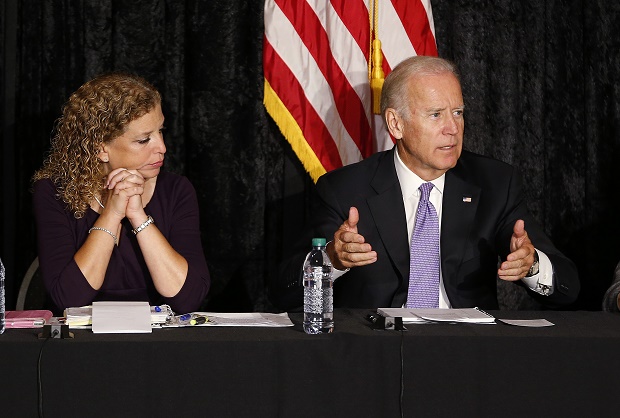
Democratic National Committee Chairwoman, Rep. Debbie Wasserman Schultz, D-Fla., left, looks on as Vice President Joe Biden discusses the Iran nuclear deal with Jewish community leaders at the David Posnack Jewish Community Center in Davie, Fla. on Thursday, Sept. 3, 2015. Exploring a presidential campaign, Biden offered a robust defense of a nuclear accord with Iran strongly backed by the White House in the latest sign of his work to present himself as a natural heir to President Barack Obama. AP
WASHINGTON — Opponents of the Iran nuclear agreement have given up trying to block it. Now they’re just hoping for a final Senate vote on a resolution disapproving it — even though such a resolution would be vetoed by the president.
The more modest focus became necessary as supporters of the deal, which aims to curb Iran’s nuclear program in exchange for sanctions relief, clinched the necessary Senate support to uphold a presidential veto of the Republican disapproval resolution. Supporters have begun aiming to amass the additional votes that could bottle up the disapproval resolution in the Senate with a filibuster and block a vote on final passage next week.
“Since it looked like the administration was closing in on enough votes to sustain a presidential veto we’ve been asking people, ‘Just in fairness, let this come to a vote,'” said Democrat turned independent Joe Lieberman, a former senator who’s rallying opposition to the deal. Given the importance of the agreement, “to have it defeated on a procedural tactic, I think, is unfair and unwise,” Lieberman said.
As of Friday opponents of the deal could lose only four more senators or risk a filibuster, after Democratic Sens. Cory Booker of New Jersey, Mark Warner of Virginia and Heidi Heitkamp of North Dakota became the 35th, 36th and 37th senators to back the deal. Supporters need 41 votes to mount a filibuster blocking a final vote on the disapproval resolution — just 34 are needed to uphold a presidential veto of such a resolution.
The announcement from Booker, in particular, was closely watched because he was under immense pressure from segments of the Jewish community in New Jersey to oppose the deal, and New Jersey’s other Democratic senator, Bob Menendez, is an outspoken opponent.
In a statement, Booker voiced deep reservations but concluded: “It is better to support a deeply flawed deal, for the alternative is worse. Thus, I will vote in support of the deal. But the United States must recognize that to make this deal work, we must be more vigilant than ever in fighting Iranian aggression.”
The announcements from all three senators underscored how unsuccessful opponents have been in turning Democratic senators against the deal, despite tens of millions spent trying and fervent exhortations from the Israeli government, which fears an empowered Iran.
In part, united Republican opposition to the deal has allowed the White House to rally Democrats to support it. Republican presidential candidate Donald Trump will headline a rally against the deal next week along with Texas Sen. Ted Cruz, also a White House hopeful.
But supporters’ ability to block a disapproval resolution in the Senate remains far from certain. Seven Democratic senators have yet to declare their stance and three or four of those are seen as potentially coming out against the pact negotiated by Iran and the US and five other world powers.
RELATED STORY
Democratic support piles up for Iran nuclear deal in Senate